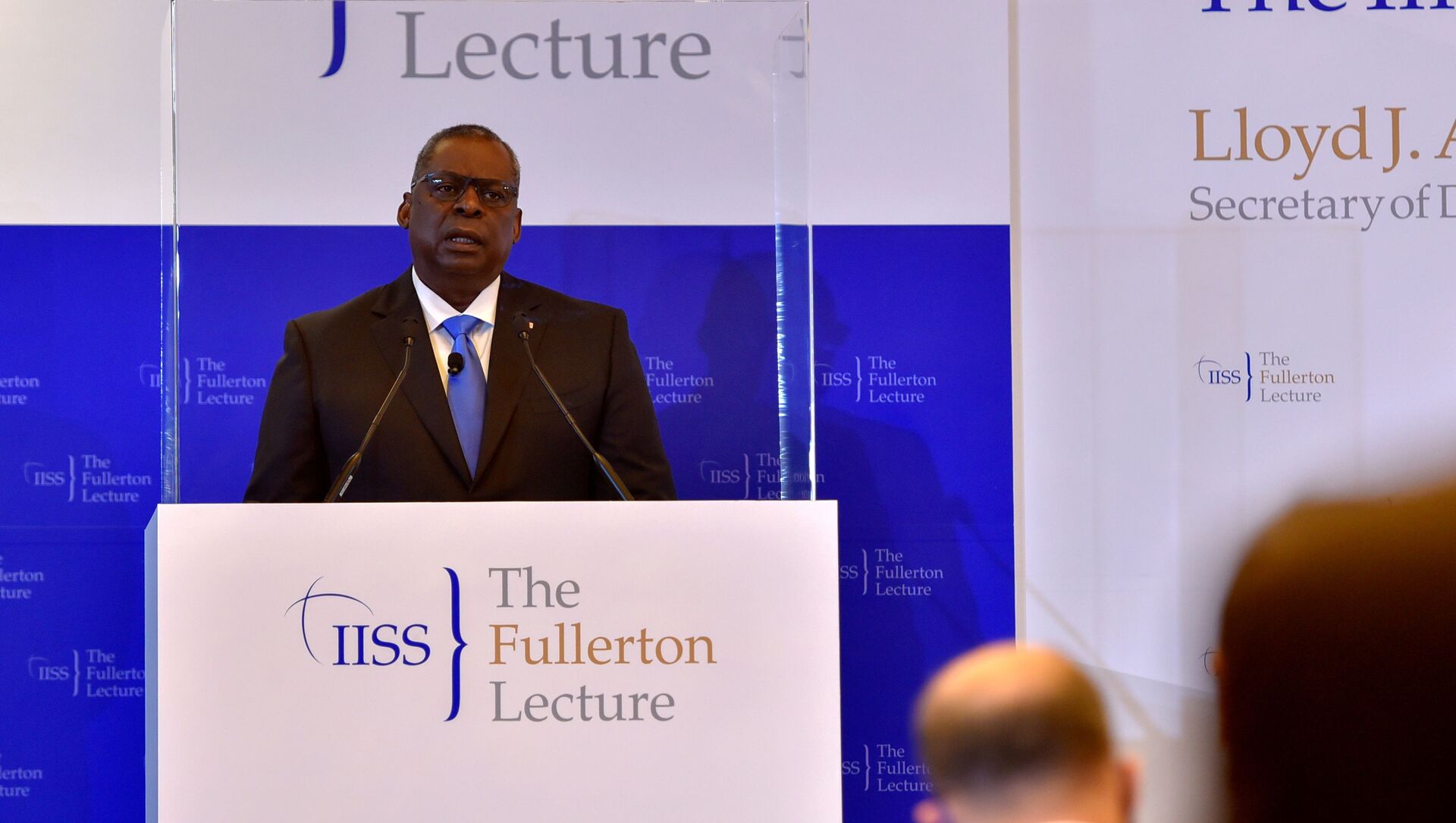After China Delivers List of Remedial Demands, Pentagon Chief Says US Wants ‘Stable Relationship’

© REUTERS / CAROLINE CHIA
Subscribe
The Pentagon chief’s comments in Singapore on Tuesday followed the typical pattern of American diplomatic statements on the issue of US-China relations: while saying he wanted peace and stability, he also levied a slew of unsubstantiated claims at China that placed sole blame for any rifts in that relationship on Beijing’s lap.
“We will not flinch when our interests are threatened, yet we do not seek confrontation,” US Defense Secretary Lloyd Austin said Tuesday at the International Institute for Strategic Studies think tank, adding that he is “committed to pursuing a constructive, stable relationship with China, including stronger crisis communications with the People’s Liberation Army.”
"Beijing's claim to the vast majority of the South China Sea has no basis in international law. That assertion treads on the sovereignty of states in the region," Austin said, according to the South China Morning Post.
"Beijing's unwillingness to resolve disputes peacefully and respect the rule of law isn't just occurring on the water: we have also seen aggression against India, destabilizing military activity and other forms of coercion against the people of Taiwan, and genocide and crimes against humanity against Uyghur Muslims in Xinjiang,” he added.
The litany of accusations is familiar, having been repeated ad nauseum by US politicians and diplomats, from the 2+2 talks in Alaska in March to the more recent meetings of US Deputy Secretary of State Wendy Sherman with Chinese foreign vice-minister Xie Feng and Chinese Foreign Minister Wang Yi on Monday, and in US President Joe Biden’s April address before a joint session of Congress on his 100th day in office.
However, Chinese responses have become sharper and more forceful in recent months, with Xie sending Sherman home on Monday with a list of complaints by Beijing and another of remedial actions Beijing expects the US to take to repair relations between the two countries. Many of them involve sanctions put in place by the US to punish various Chinese government and Communist Party of China officials for their involvement or proximity to the US’ pet issues in China, including Hong Kong, Xinjiang, Taiwan, the South China Sea, tech giants like Huawei, and the origins of the SARS-CoV-2 novel coronavirus.
Wang similarly said that China and other nations must give the US “a good tutorial” in how to treat other nations as equals, because of how Washington behaves as if “it is superior to others.”
By contrast, Chinese Foreign Ministry spokesperson Zhao Lijian’s comments were more measured, saying that “the two sides had deep and thorough conversations, and enhanced mutual understanding.”
“There is a big question mark on whether bilateral ties will head to conflict and confrontation or improvement and development,” Zhao told reporters on Tuesday. “The US needs to think carefully and make the right choice.”
Austin specifically addressed the situation in the South China Sea, which Singapore sits at the southernmost tip of. Washington has inserted itself into a regional dispute over maritime claims in the waterway, where not just China, but Taiwan, the Philippines, Brunei, Malaysia, and Vietnam are involved.
The nations have recently redoubled their efforts to arrive at a Code of Conduct governing interactions in the South China Sea, but the US has erroneously claimed that China is imposing its will on the other countries.
“We don’t believe that any one country should be able to dictate the rules or worse yet, throw them over the transom, and in this regard I’ll emphasise our commitment to freedom of the seas,” Austin said, adding that he believed Beijing’s claims were “unhelpful and unfounded.”
China has laid claim to an area of the waterway encompassing several archipelagoes of tiny islands called four-sha (four sands) based on historic sovereignty. In June 2020, the US Department of State formally rejected most of Beijing’s claims, and has stepped up the so-called “freedom of navigation operations” (FONOPS) it uses to demonstrate contempt for them.
In addition, US military drills and reconnaissance flights have also greatly increased, and US allies like the United Kingdom have sent their own carrier battle group to drill in the sea.
China has condemned the actions by the US and its allies in the South China Sea region as “destabilizing.”

